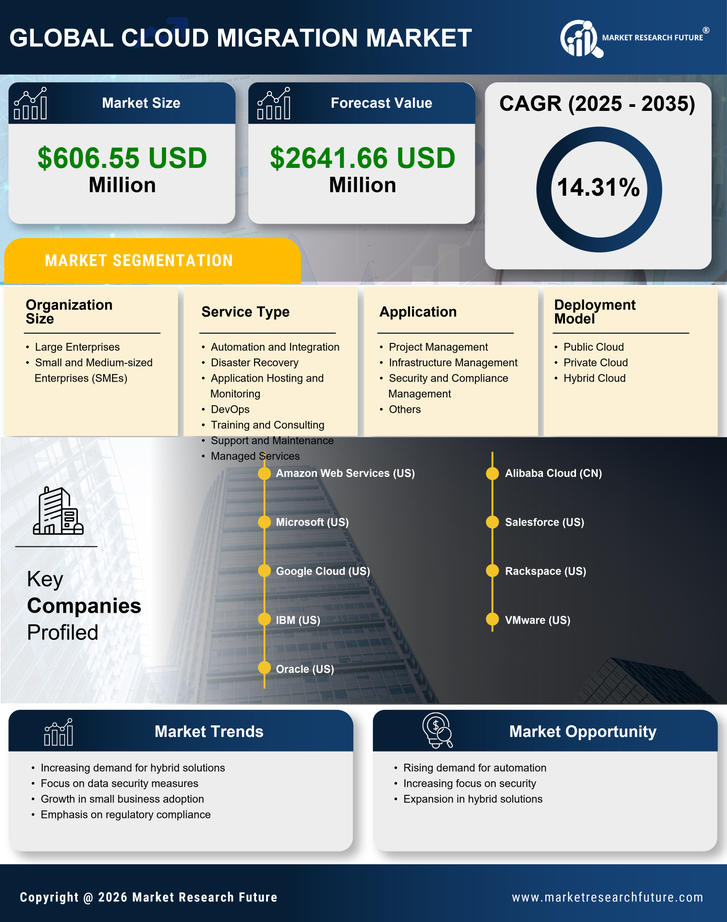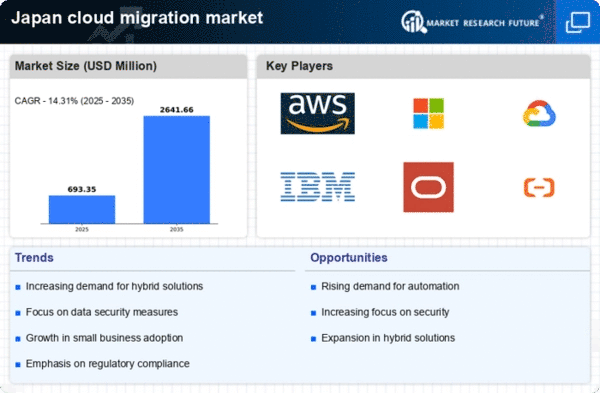Emergence of Advanced Technologies
The emergence of advanced technologies is a significant driver for the cloud migration-services market in Japan. Innovations such as artificial intelligence, machine learning, and the Internet of Things (IoT) are increasingly being integrated into cloud solutions, prompting organizations to migrate their data and applications to the cloud. In 2025, it is projected that the adoption of AI-driven cloud services will grow by approximately 40%, indicating a strong trend towards leveraging these technologies for enhanced operational efficiency. As businesses recognize the potential of advanced technologies to transform their operations, the demand for specialized migration services that can facilitate this transition is expected to rise. Thus, the cloud migration-services market is likely to experience robust growth fueled by the integration of cutting-edge technologies.
Growing Demand for Digital Transformation
The cloud migration market in Japan experiences a notable surge in demand driven by the ongoing digital transformation initiatives across various sectors. Organizations are increasingly recognizing the necessity to modernize their IT infrastructure to enhance operational efficiency and agility. As of 2025, approximately 70% of Japanese enterprises are expected to prioritize cloud adoption as a core component of their digital strategies. This shift not only facilitates improved data management but also enables businesses to leverage advanced technologies such as artificial intelligence and machine learning. Consequently, the cloud migration-services market is poised for substantial growth as companies seek to transition their legacy systems to cloud-based solutions, thereby fostering innovation and competitiveness in the digital landscape.
Regulatory Compliance and Data Sovereignty
Regulatory compliance and data sovereignty are pivotal factors influencing the cloud migration-services market in Japan. As businesses navigate a complex regulatory landscape, the need to adhere to local data protection laws becomes paramount. The Personal Information Protection Act (PIPA) mandates strict guidelines for data handling, compelling organizations to ensure compliance during their migration processes. This regulatory environment creates a demand for specialized migration services that can facilitate adherence to legal requirements while optimizing cloud solutions. In 2025, it is anticipated that compliance-related services will constitute a significant portion of the cloud migration-services market, as companies prioritize secure and compliant data management practices. Thus, the interplay between regulation and cloud migration services is likely to shape market dynamics in Japan.
Shift Towards Remote Work and Collaboration
The shift towards remote work and collaboration tools is reshaping the cloud migration-services market in Japan. As organizations adapt to new work paradigms, the demand for cloud-based solutions that support remote collaboration is intensifying. By 2025, it is estimated that over 60% of Japanese companies will have adopted cloud-based collaboration tools, necessitating effective migration strategies to ensure seamless integration. This trend not only enhances productivity but also fosters a culture of flexibility and innovation within the workforce. Consequently, the cloud migration-services market is likely to benefit from this shift, as businesses seek expert guidance to transition their operations to cloud environments that facilitate remote work and collaboration.
Increased Investment in Cloud Infrastructure
Investment in cloud infrastructure is a critical driver for the cloud migration-services market in Japan. With the increasing reliance on cloud technologies, businesses are allocating significant budgets to enhance their cloud capabilities. In 2025, it is projected that the cloud infrastructure spending in Japan will reach approximately $15 billion, reflecting a robust growth trajectory. This influx of capital is likely to stimulate demand for migration services as organizations seek to optimize their cloud environments. Furthermore, the competitive landscape compels companies to adopt cutting-edge solutions, thereby driving the need for expert migration services to ensure seamless transitions. As a result, the cloud migration-services market is expected to thrive, supported by the escalating investments in cloud infrastructure.

















